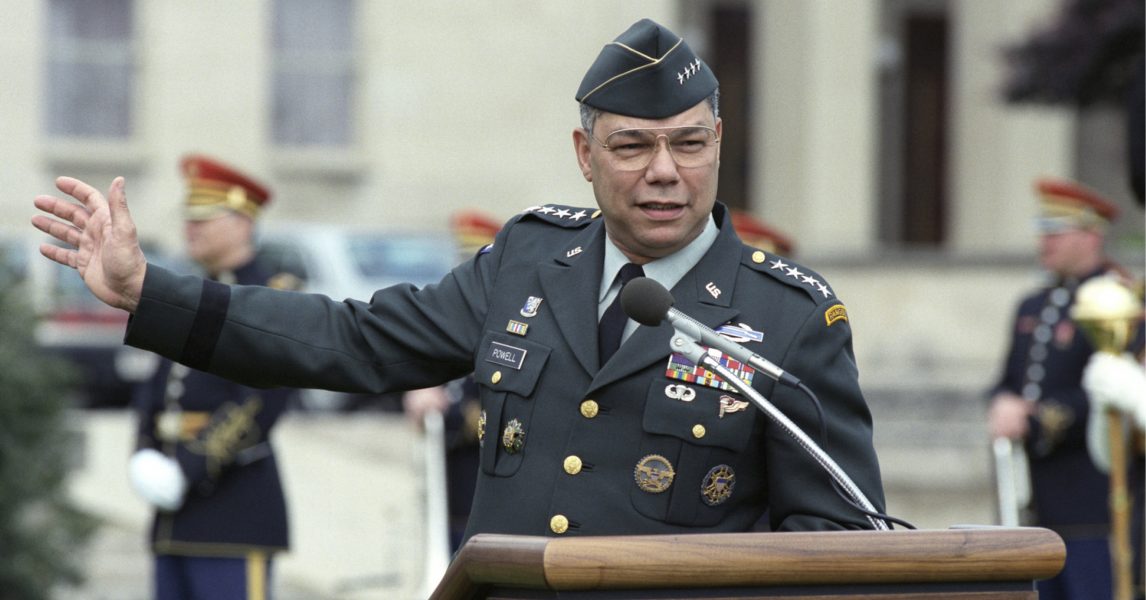As the first African American appointed to serve as Secretary of State, Colin Powell was a trailblazer for generations to come. An individual who committed his life to serving his country, Powell spent 35 years in the Army, including two combat tours in Vietnam and postings in West Germany and South Korea. He was recognized for his bravery in 1968, after surviving a helicopter crash and rescuing three soldiers from the wreckage. Powell would go on to receive many other medals for his service.
Former vice president Dick Cheney said in a statement following Powell’s passing, “He was a man who loved his country and served her long and well. Working with him during Operations Desert Shield and Desert Storm, I saw first-hand General Powell’s dedication to the United States and his commitment to the brave and selfless men and women who serve our country in uniform.”
Twice the recipient of the Presidential Medal of Freedom, Powell was characterized as a “favorite of Presidents” and as “highly respected at home and abroad” by President George W. Bush. In addition to being the Secretary of State, Powell served as the National Security Advisor under President Ronald Reagan and Chairman of the Joint Chiefs of Staff under Presidents George H.W. Bush and Bill Clinton.
While Powell left his mark on American history, he also taught us significant leadership lessons in his 13 Rules found in his memoir, “It Worked for Me: In Life and Leadership.”
Here are 5 of his rules leaders can glean from today.
“Get mad, then get over it.” While serving as Secretary of State, Powell was said to have not always agreed with decisions from the administration. In an interview with NPR in 2011, Powell said, “I mean, have you ever seen an administration where there weren’t different points of view within it? If you find one, let me know. And if there is one, it isn’t functioning very well. You have to have differences of opinion.” Leaders will always encounter individuals who have differing viewpoints, and some frustration is healthy. However, leaders must not allow their frustrations to dictate their future interactions.
“Avoid having your ego so close to your position that when your position falls, your ego goes with it.” Although Powell’s term as Secretary of State may have been marred by his defense of the invasion of Iraq and his presentation at the United Nations which was later found to be erroneous, Powell didn’t allow it to affect his impact on society. After his resignation as Secretary of State, Powell continued his work with America’s Promise Alliance, an alliance of nonprofit, community organizations, businesses and government organizations dedicated to improving the lives of young people. A leader should never be so tied to their role that they lose who they are and their sense of purpose.
“Share credit.” Powell often shared an important leadership lesson he learned from Reagan. While trying to tell Reagan all of his problems, Reagan watched the squirrels, not paying attention to what Powell was saying. Powell said it demonstrated how Reagan trusted him to make decisions. It taught him the importance of empowering his subordinates to make decisions. By sharing the credit, leaders empower others to fulfill their roles.
“Don’t let adverse facts stand in the way of a good decision.” During his term as Secretary of State, Powell was known for reaffirming diplomatic alliances throughout the world. Powell worked to improve the difficult interactions the U.S. had with Russia and China. This resulted in the withdrawal from the U.S. Russian Anti-Ballistic Missile treaty and the signing of the Moscow Treaty on Strategic Offensive Reductions. Powell didn’t allow the tensions that previous administrations had with these countries to keep him from improving diplomatic alliances. Instead of looking at negative facts, leaders need to look for positive ways to move forward.
“It can be done!” Born in Harlem to Jamaican immigrant parents, Powell was taught early on the importance of personal achievement and education. While enrolled in City College of New York, he joined the Reserve Officers’ Training Corps and graduated at the top of his class with the rank of cadet colonel. Powell would go on to become a four-star general and provide pivotal leadership under four different presidents. Leaders have the ability to accomplish great things in their professional and personal lives when they set their minds to it.
As America celebrates the life and legacy of Colin Powell, he can be remembered as an individual who committed his life to the betterment of our nation. In a time where political division seems all too present, we need more leaders like Powell who recognized that differences are what make our nation great. Powell taught us the importance of leading by emphasizing the best in others, striving for great personal achievements and not letting opposition keep us from moving toward positive change.

